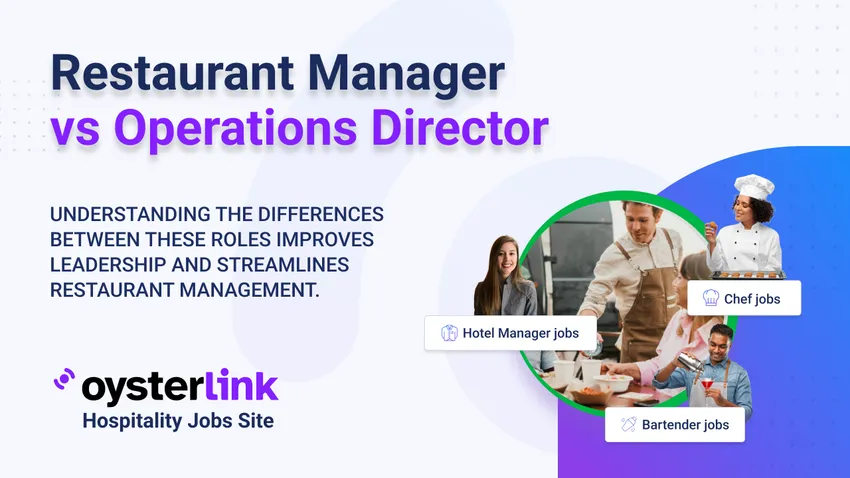A strong leader is the backbone of any successful restaurant — this role can be filled by either the Restaurant Manager or the Director of Restaurant Operations.
Both positions require a deep understanding of the industry's complexities, from managing staff and finances to creating a great dining experience for guests.
Given the complex nature of these two roles, it’s important to understand the distinctions between them and how each contributes to a restaurant's success.
Director of Restaurant Operations vs. Restaurant Manager: Key Differences
Both the Director of Restaurant Operations and the Restaurant Manager are key in making a restaurant succeed, but they focus on different things.
The Director of Restaurant Operations is a senior leader who looks at the big picture. They develop plans, set goals, and make sure different parts of the operation work together to achieve the company's overall success.
Their role is more strategic — focused on long-term growth and overall performance.
The Restaurant Manager, on the other hand, handles the day-to-day stuff. They're the one managing staff schedules, controlling inventory and making sure guests have a great experience.
It’s all about making sure everything runs smoothly on a daily basis. They’re hands-on with their team and often the first person guests and staff turn to with issues.
So, while the Director maps out the road ahead, the Manager makes sure everyone gets there smoothly.
Here’s a quick comparison table:
| Aspect | Restaurant Manager | Director of Restaurant Operations |
|---|---|---|
| Focus areas | Daily operations, staff management, customer service | Strategic planning, business optimization, goal alignment |
| Key responsibilities | Scheduling, inventory management, issue resolution | Developing business plans, managing finances, implementing strategies |
| Role in leadership | Hands-on, detailed execution of daily tasks | Broad oversight, aligning department goals |
| Contact for | Staff and customers for immediate concerns | Managers and senior teams for strategic initiatives |
What Is the Role of a Restaurant Manager?
As we’ve mentioned, the Restaurant Managers’ job is to oversee the day-to-day operations of a dining establishment.
They manage both the front-of-the-house and back-of-the-house staff.
Here’s a quick overview of their responsibilities:
- Training, mentoring and evaluating staff members
- Creating proper schedules for staff to ensure smooth operations
- Handling customer inquiries and complaints, always aiming to exceed expectations
- Conducting regular inspections to maintain cleanliness, hygiene and safety standards
- Optimizing supply and inventory levels to minimize waste
- Working closely with the Cook or the Chef to maintain quality and consistency of menu items
- Implementing promotions and marketing strategies to attract and retain customers
- Monitoring sales performance and implementing cost-saving measures
What Is the Role of a Director of Restaurant Operations?
The Director of Restaurant Operations has a more overarching role in the organization.
They provide long-term plans for the restaurant company to ensure the brand’s longevity and profitability.
If the restaurant has different locations, all Restaurant Managers (or General Managers) of those branches will report to the Director of Restaurant Operations.
Below is a list of primary responsibilities for Directors of Restaurant Operations:
- Overseeing operations across all departments or different restaurant locations
- Optimizing business processes to deliver better results and efficiency
- Analyzing the restaurant's financial performance to drive long-term profitability
- Developing and overseeing the implementation of strategies based on market trends and the company’s goals
- Recruiting and training those in managerial or supervisory positions and evaluating their performance
- Working with the culinary and beverage teams to create new and unique menu offerings
- Negotiating contracts and building strong relationships with suppliers and vendors
Skills Required for Each Role
While both Restaurant Managers and Operations Directors oversee business performance, the skill sets required for each role differ:
| Restaurant Manager | Director of Restaurant Operations |
|---|---|
| Leadership: Inspiring and guiding the team towards shared goals | Strategic leadership: Creating and executing long-term plans |
| Problem-solving skills: Addressing daily challenges and quickly finding solutions | Decision-making skills: Resolving complex operational and business challenges |
| Organizational skills: Prioritizing tasks and managing multiple responsibilities | Operational expertise: Streamlining processes, increasing efficiency and ensuring consistency |
| Customer service: Building relationships with customers and addressing their inquiries or requests | Market analysis: Understanding industry trends and customer preferences |
| Basic financial skills: Understanding budgets, costs and revenue | Financial management: Analyzing financial data to make informed decisions and drive profitability |
Developing these skills is crucial for success in either position and can help restaurant professionals transition from management to director-level roles.
Educational and Experience Requirements
While a bachelor's degree in hospitality management or business administration is often preferred for both roles, the depth and breadth of experience required can differ:
- Restaurant Manager: Typically requires several years of experience in restaurant operations, with a focus on day-to-day management and customer service excellence.
- Operations Director: Generally necessitates extensive experience in multi-unit management, strategic planning, and a proven track record of driving operational success across multiple locations.
Advanced certifications in restaurant management or business operations can further enhance a candidate's qualifications for these leadership positions.
Salary Comparison: Restaurant Manager vs. Director of Restaurant Operations
There’s a fairly huge difference in the average salaries for these two roles. Key factors contributing to this difference include the scope of responsibilities and overall impact on the business's bottom line.
In the U.S., the average Restaurant Manager's salary is $69,580 per year or $5,798 per month.
Meanwhile, Directors of Restaurant Operations have an average salary of $102,697 per year or $8,558.08 per month.
Of course, the Directors of Restaurant Operations earn more as they hold a senior management position in the company.
Can a Restaurant Manager Become a Director of Restaurant Operations?
Yes, becoming Director of Restaurant Operations is part of a Restaurant Manager’s career progression.
Many successful Directors, no matter what the industry, start their careers as Managers.
The experience you gain from handling the day-to-day operations of a restaurant is essential for the duties of a Director of Restaurant Operations.
But to transition to the role, you'll need to develop broader skills and perspective, including:
- Strategic thinking
- Leadership on a bigger scale
- Financial analysis and planning
- Market analysis and identifying trends
Learn more about the Director of Restaurant Operations role and get insights into the skills and qualities you’ll need for this position.











Loading comments...